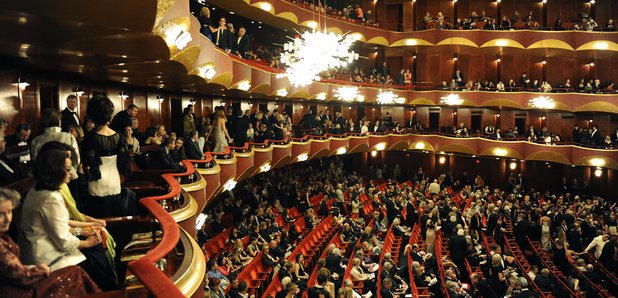Metropolitan Opera Talks Restart as Lockout Looms
Union Officials Hold Little Hope of Reaching Deal Before Deadline
July 28, 2014 9:21 p.m. ET
The Metropolitan Opera singers union resumed contract talks on Monday after a
two-month hiatus, but union officials said they had little hope of reaching an agreement before a threatened lockout.
Intense
negotiations are expected this week as contracts expire for 15 of the
Met's 16 unions on Thursday. Last week, the opera company's general
manager,
Peter Gelb,
advised union members to
prepare for a lockout starting Friday.
Mr.
Gelb has said he is seeking labor-cost savings of 16% to 17%, as the
company grapples with faltering ticket sales, a depleted endowment and
rising operating costs.
Union leaders have countered that the Met should curb what
they have described
as out-of-control spending by Mr. Gelb. They say his proposed work-rule
and benefit changes would result in losses for their members of more
than 17%.
Before the talks began Monday, emotions ran high among members of the singers union.
"He doesn't want to help us maintain our instruments," said chorus member
Jean Braham,
commenting on the effect Mr. Gelb's proposed high-deductible health plan could have on singers' voices and bodies.
"We
are the artists," Ms. Braham said, her voice cracking. "We are the
product. The fact that he accepts no responsibility and no
accountability is just incredible to me."
Met
spokesman
Sam Neuman
said the chorus members "are among the highest-compensated
artists in their field—a status that will not change as a result of the
current contract negotiations. We hope that they will recognize the need
to share in our institutionwide plan of cost controls to secure the
future of our company."
Full-time chorus
members earned an average of $200,000 for the 2012-2013 season,
including revenue sharing from high-definition broadcasts and overtime
from several four-hour-plus operas. Orchestra members that year had
median earnings of about $191,000.
During
the talks, the American Guild of Musical Artists, which represents
singers, dancers and stage managers, presented a proposal for a series
of 2% raises over each of the next three years.
Union officials also said they had asked the New York attorney general to examine the Met's heavy draws from its endowment.
The endowment stood at $267 million as of July 11, down from $305.8 million in July 2006, according to the Met.
Mr. Neuman said the company's endowment "has been in full compliance with all applicable laws and best practices."
A spokesman from the attorney general's office declined to comment.
The tone of discussions remains acrimonious as the parties enter the final stretch before Thursday's deadline.
On
Friday, the orchestra union presented an 84-page proposal to Met
officials, blaming the box-office drop on Mr. Gelb's artistic choices
and proposing $31 million in alternative cost savings.
The proposals included lowering ticket prices, shortening rehearsals and decreasing the number of new productions.
The
orchestra also presented an analysis of music critics' reviews,
concluding that Mr. Gelb's new productions have received more negative
coverage than positive.
On Saturday, the
Met responded with a 53-page rebuttal. It called the orchestra's
analysis "erroneous" and its proposals "ill-advised" and "not
realistic."
Lowering ticket prices
would likely decrease, not increase, revenue, the Met said. It added
that its productions have always received a mix of positive and negative
reviews.
Of the three biggest unions,
the stagehands have adopted the most moderate tone, suggesting that they
would be willing to consider concessions—with a caveat.
"We're willing to tighten our belts, but Peter Gelb has to cut up his credit cards," said
Joe Hartnett,
who is coordinating negotiations for six units of the International Alliance of Theatrical Stage Employees.
In
a letter dated July 18 and posted online Monday, union president
Matthew Loeb
asked board members to encourage Mr. Gelb to bargain with "a more
collaborative spirit," arguing that management had shown "blindness" to
potential savings.
Mr. Neuman said the
Met intends to work collaboratively to reach an agreement, and noted
that administrative staff would take cuts on par with negotiated union
reductions.
























![[met3]](http://si.wsj.net/public/resources/images/OB-JM783_met3_G_20100806232843.jpg) Associated Press
Associated Press 

















 If Broadway shows have gotten unusually expensive, one major reason is the dominant presence of
If Broadway shows have gotten unusually expensive, one major reason is the dominant presence of 





























No comments:
Post a Comment